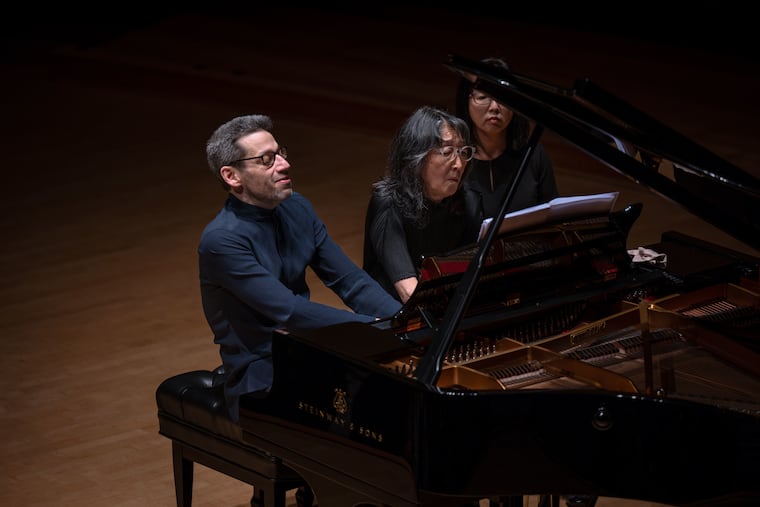The season’s hottest classical might have been this four-hand piano recital
The Jonathan Biss-Mitsuko Uchida concert sold out last June. The duo delivered profoundly beautiful Schubert.

If classical music has a party animal of the repertoire, it’s four-hand piano music. The natural habitat of these works is less the concert hall than a cozy living room, often enhanced with the distinctly personal element of the performers being friends or relatives. In my own family, we once had a tradition of dim sum on Washington Avenue followed by jostling elbows at the keyboard in the sunny parlor of my mother’s South Philly brownstone.
Friday night’s four-hand recital by Jonathan Biss and Mitsuko Uchida arrived in a more institutional setting — the Kimmel Center’s Perelman Theater — but the pianists’ rapport with their Philadelphia Chamber Music Society audience did not want for intimacy, or intensity.
Essentially sold out since last June with a waiting list of a hundred, the concert by the two codirectors of the Marlboro Music Festival was likely the classical season’s hottest ticket. To be there practically guaranteed deep engagement (not to mention bragging rights).
But just as powerfully, it was Uchida and Biss’ high level of interpretive detail in the all-Schubert program that mesmerized, even in the thicket of the evening’s most sprawling work. Let’s be honest: The composer’s Divertissement à la hongroise, D. 818 goes on a bit. The last movement alone weighs in at about 15 minutes, and the material is repetitive.
The pianists, though, heightened the Hungarian flavor elegantly but with an edge. Uchida, on the right end of the keyboard for the piece, has an immediacy to her playing that makes you track every note. The duo used subtle tempo and dynamic shifts in that third movement to build climaxes and shape a story that seemed almost programmatic in stretches.
For pure firepower, Biss and Uchida delivered in the Allegro in A Minor, D. 947. This is a piece that really wants to be symphonic, the pianists suggested that kind of scale — from an explosive, angry tutti without any deterioration in sound quality, down to a quiet reserve suggesting soft orchestral strings.
They put two works in dialogue with each other, one funereal and the other carefree and youthful: the March in E-flat Minor, D. 819, No. 5 and Rondo in A Major, D. 951. The A Major Rondo is well known, and the sometimes breezy performances of it can make it sound like a plaything. Not so here. Biss and Uchida slowed it down, all the better to enjoy Biss’ ornamental finesse. The more profound benefit took shape in the last minute or two, starting where Uchida had the melody and Biss a countermelody of exquisite freedom, and then the work ends in a mood so peaceful it was nearly prayerful.
Schubert’s catalog is filled with works that might have made for an emphatic encore, but the duo chose a beautifully meditative one: the Kurtág transcription of Bach’s Actus Tragicus.
It’s not often you hear two musical forces of such strongly different temperaments on one stage, and even less often accommodating each other so unreservedly. On other occasions, Uchida has sometimes been mercurial, sending phrases off with unexpected spin, and in the past Biss has struggled with a palpable nervousness. Four hands didn’t become one here, but the pianists both became better versions of themselves. Which is quite something considering how wonderful each one was to begin with.
The Philadelphia Chamber Music Society next season presents Simone Dinnerstein and Awadagin Pratt in a two-piano recital, Feb. 5, 2025; and Lydia Artymiw and Cynthia Raim in four-hand and solo works, May 6, 2025. Both concerts are at the Perelman Theater, Broad and Spruce Streets. pcmsconcerts.org, 215-569-8080.